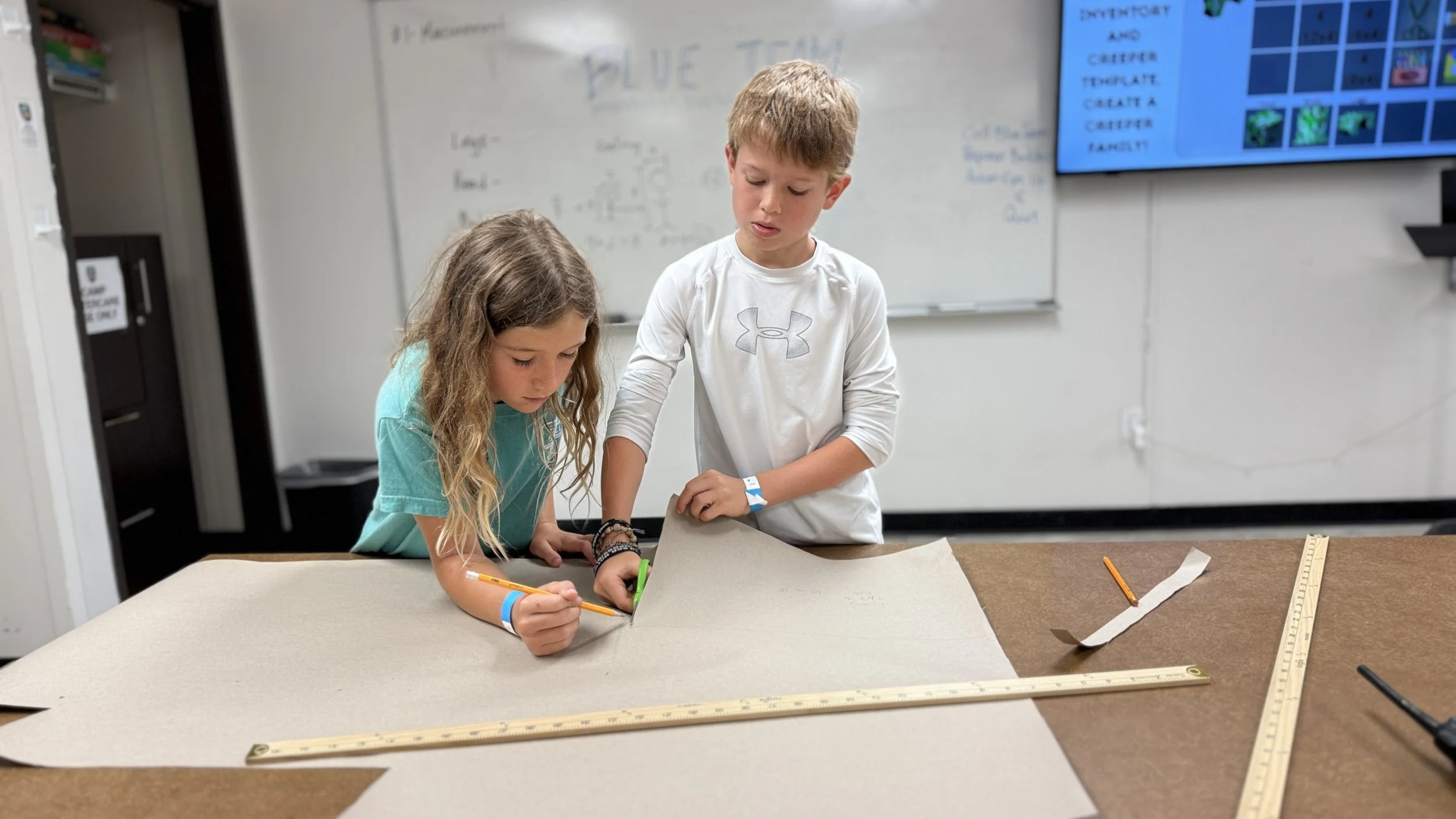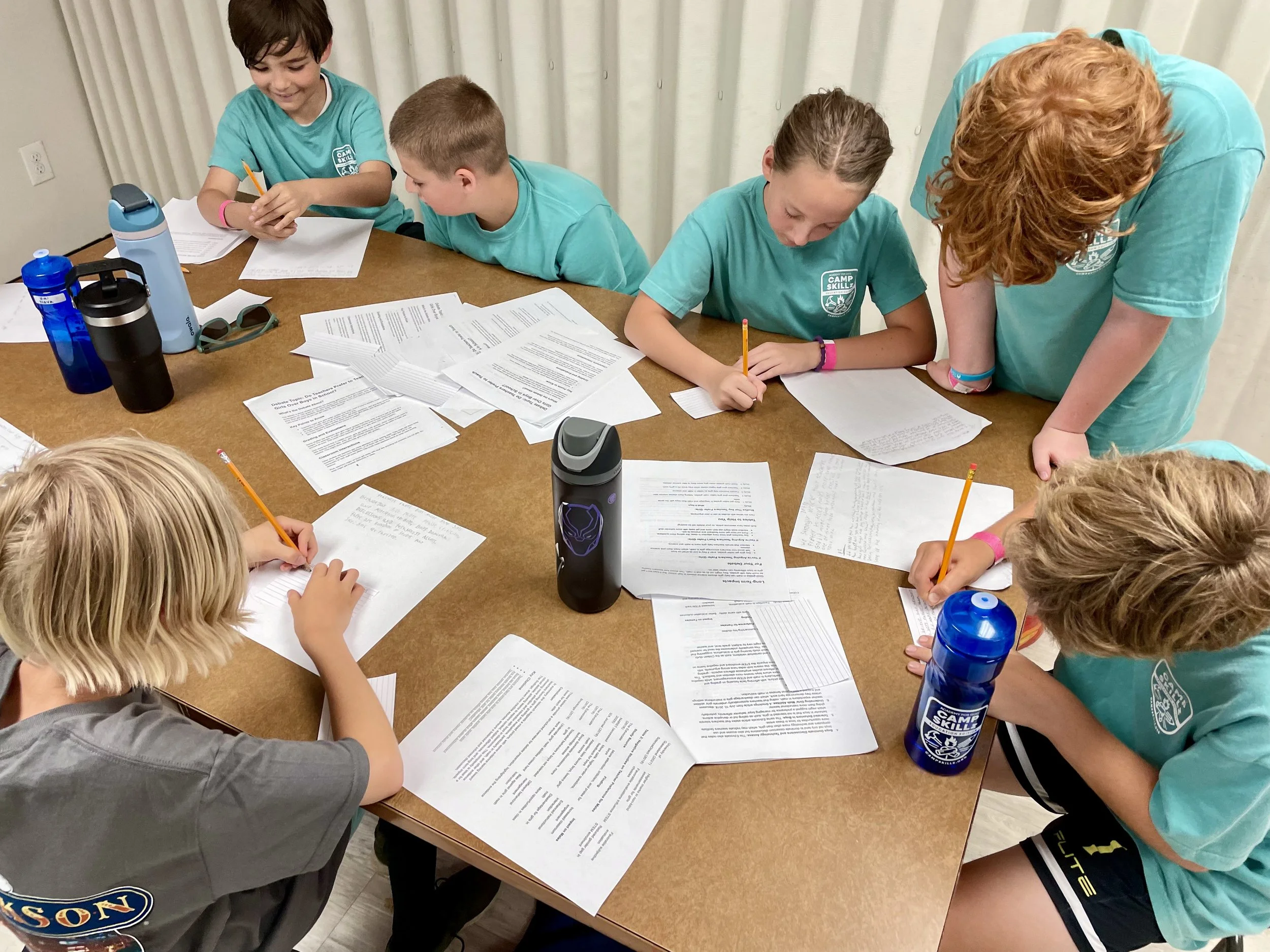Summer Learning at Camp Skillz: Education Edition
This summer, The Academy for GOD hosted Camp Skillz: Education Edition, a dynamic day camp designed to bridge the gap between school years with purpose and play. We recognize that the summer months can be a time to maintain momentum, deepen understanding, and prepare students for the next school year. That’s why we created Camp Skillz: Education Edition, a summer program designed to carry children forward in both academic content and personal development through an engaging, project-based approach.
Each week featured a unique theme and academic focus, inviting campers into hands-on learning experiences that sharpened skills, built character, and made summer memories!
Week 1: Born to Be Bold
Academic Focus: Language Arts
Inspired by The Descendants, Week One focused on identity, character, and the power of good choices. Through storytelling, journaling, dramatic play, and debate, campers explored what it means to be persons of integrity while strengthening essential language arts skills like reading comprehension, descriptive writing, and public speaking. The week culminated in song, skits, and debates performed in front of the entire camp!
Week 2: Builders of the Blockverse
Academic Focus: Science
The second week took inspiration from the creativity of Minecraft and launched campers into a world of design, engineering, and exploration. With a strong emphasis on the scientific method, students tested hypotheses, built models, and designed imaginative "block worlds" using real-world science principles.
From learning about force and motion to exploring simple machines, campers engaged in age-appropriate STEM activities that taught them to observe, question, test, and revise. Group collaboration was essential, with each team creating either catapults or creepers for the end of the week challenge. Don’t miss the photos below!
Week 3: Game On! Level Up!
Academic Focus: Math
Our final week of camp brought the energy of a MrBeast-style challenge arena to life! Campers dove into high-paced contests and games that required logic, pattern recognition, probability, and strategy. Week 3 ended with an epic obstacle course math challenge for all campers!
Learning with Purpose and Play
Across all three weeks, Camp Skillz was designed to develop not only academic skills but also confidence, creativity, collaboration, and character. Our Academy teaching staff created a fun and structured environment that allowed students to embrace summer learning with positivity.
Thank You for an Incredible Summer
Thank you to the families who entrusted us with their children’s summer camp experience. We believe our campers developed friendships, academic skillz, and memories to hold!
To all our campers: thank you for showing up, trying hard, being kind, and having fun. We can’t wait to see what next summer holds.
Until then—stay bold, keep building, and never stop leveling up!
Check out the photos below highlighting some of our favorite camp moments!
Jr High & High Students on Mission this Summer
This summer, junior high and high school students from The Academy for GOD gave their all in a powerful week of mission work throughout Nashville. Partnering with SLAM Missions, these young disciples took their faith beyond the classroom, stepping boldly into neighborhoods and nonprofits across the city to serve, love, and reflect the heart of Jesus.
Throughout the week, students worked alongside Nashville-based organizations like McKendree Village, Catholic Charities of Tennessee, The Branch of Nashville, and FiftyForward. From food pantries to senior living homes, local gardens to children's camps, they embraced each opportunity to serve with humility and joy. Tasks varied—from preparing and delivering meals to cleaning, facilitating activities, and simply spending quality time with seniors or underserved families. Every act of kindness was rooted in their desire to live out teachings from the bible in real, tangible ways.
A true highlight of the week was the students’ leadership at three kids camps, each serving refugee children from Somali, Colombian, and Afghan backgrounds. Through songs, storytelling, crafts, and joyful play, our students created a safe and Christ-centered environment where each child was seen, celebrated, and loved. These were beautiful moments of cross-cultural ministry—full of laughter, connection, and the unmistakable presence of God.
With SLAM, service is only part of the experience. Each evening, students gathered together for worship and Bible study, and what unfolded in those sacred moments was deeply transformative. Students shared times of worship and testimonies, prayed over one another, and experienced spiritual breakthroughs that our staff prays will carry into every area of their lives.
The week's spiritual anchor came through the “Nu Nation” Bible study series, led by The Academy Head of School, Mr. Garner, and our dedicated Academy staff. Centered around 1 Peter 2:9, students explored what it means to be part of God’s chosen nation—set apart, with a unique purpose. They considered questions like:
What is a nation in God’s eyes?
What are we building with our lives?
What does it mean to be a chosen priesthood?
Students were challenged to see themselves as bridge-builders—priests in their schools, families, and friend groups, called to help others connect with the living God.
We are incredibly proud of each student who gave up part of their summer to be the hands and feet of Jesus. Their willingness to serve, learn, worship, and grow was nothing short of inspiring. A heartfelt thank you goes to the local nonprofits who welcomed us, and to our amazing teachers and staff who guided students in connecting Bible teaching with everyday mission.
This summer, our students had the opportunity to live the mission. And in doing so, they brought light, hope, and the love of Christ to the heart of Nashville.
Watch the SLAM 2025 Review Video below!
Academy Faculty Professional Development in New York: Trip Review
This spring, a team of 17 teachers and administrators from the Academy for GOD had the incredible opportunity to attend the ResearchEd conference in New York. This professional development experience was more than just an educational event; it was a moment of collective growth, reflection, and energizing focus for our instructional team.
Written by Craig Duffy, Director of Education
This spring, a team of 17 teachers and administrators from the Academy for GOD had the incredible opportunity to attend the ResearchEd conference in New York. This professional development experience was more than just an educational event; it was a moment of collective growth, reflection, and energizing focus for our instructional team.
Research Ed is internationally renowned, with a focus on bridging the gap between research and practice in the field of education. As their name implies, each session topic was based on carefully executed research, providing a strong body of evidence to support strategies for age-old teaching challenges like memory recall, distraction, cognitive overload, and more. ResearchEd was a great fit for our mission at the Academy, allowing us to dive into research-based practices that align with both academic rigor and the deeper calling we have as Christian educators.
Academy Headmaster Corey Foster, who spearheaded the whole trip, carefully organized the team to be partnered up and spread out amongst the most relevant sessions, to maximize the benefits of this rich opportunity. Teachers at Kindergarten and lower elementary levels dove into topics like learning through play, whole body learning, and how to empower students to refocus themselves when they become distracted. Jr. High and High teachers examined research related to blocking (teaching a new concept and focusing on one thing at a time) and incorporating that with memory retrieval practices to build a strong knowledge base.
Surrounding the sessions, teachers and administrators met up for discussion on how to apply content to our Academy classrooms. Teachers shared ideas related to skill acquisition activities, while administrators discussed how our school evaluates and uses educational research. It was a wonderful and energizing moment to pause, reflect, learn and share ideas!
One teacher shared, “I want to take a moment to sincerely thank you all for the opportunity to attend ResearchEd. It was an incredibly valuable experience, and I truly appreciate the investment in my professional growth.” Another added, “This PD weekend strengthened our staff as a team and energized us to give all we have to serve our students with intentionality.”
Outside of the conference sessions, Academy Founder Gregg Garner put great care into coordinating moments of conversation and unifying experiences. From table fellowship to Creative and Performing Arts outings, to weaving through New York traffic together on bicycles, the intentional time together was unifying and energizing! The team returned refreshed and excited about finishing the year with excellence, and continuing to refine our educational endeavors.
As we reflect on this trip, I am reminded of Colossians 3:23, which says, “Whatever you do, work at it with all your heart, as working for the Lord.” This experience reaffirmed that our work in education is not just about information—it’s about transformation. We left New York equipped, encouraged, and excited to bring that transformation back to our classrooms.
We’re grateful for what this trip has meant to us as a team and to the future of our Academy students. May this be just one of many steps in our continued journey toward excellence in Christ.
How Nutrition Impacts Learning
School nutrition is not just childhood nutrition or adolescent nutrition, it is specific to nutrition while students are in school. This is an important distinction as we are looking most at how these meals will affect a student while they are in school. Our goal as a school nutrition program is to take a look at the ways we can help our students progress, learn and focus while they are on our school campus.
School nutrition is not just childhood nutrition or adolescent nutrition, it is specific to nutrition while students are in school. This is an important distinction as we are looking most at how these meals will affect a student while they are in school. Our goal as a school nutrition program is to take a look at the ways we can help our students progress, learn and focus while they are on our school campus.
What are some key nutrients students need to learn in school?
Dietary Fiber (Carbohydrates): A big part of school nutrition is ensuring students feel fuller longer. We want students to be in the classroom learning, listening, and absorbing knowledge not worrying about a growling stomach. A meal full of dietary fiber has the power to keep your student feeling fuller for a longer amount of time, since it will take more time for them to digest those foods. Foods rich in dietary fiber include whole grains, most fruits, vegetables, and even legumes.As part of the national school lunch program we are required to serve all students whole grains along with a fruit and vegetable every day. We are also required to have at least 1 serving of legumes per week. Each school lunch provides a more than adequate amount of dietary fiber to keep students feeling full during their school day.
Iron: Iron is another key nutritional component to school meals because of its role with memory and brain function. Students with optimal iron intake will also be less likely to be fatigued and prone to sickness. Iron is found in many different foods including, whole grains, dark leafy greens, red meats, poultry and more. School nutrition menu requirements also mandate that programs have a variety of vegetable subgroups which ensures students have access to the type of nutrients that support their body function. Our program must serve a certain amount of dark leafy greens, regular leafy greens, red/orange vegetables etc. This variety is key for optimal nutrient density in meals.
Protein: If the average elementary school student weighs about 80 lbs they would need about 40 grams of protein per day. In a single lunch they will be offered up to 25-27 grams of protein. This means a single lunch provides students with at least half or more of their daily protein intake. Protein is an essential nutrient for overall body function and when it comes to staying full longer allowing students to stay focused and ready to learn in their classes. A deficiency of amino acids (which are found in protein) for one could lead to an inability to focus during the day, which in turn could lead to behavioral problems and not retaining content learned in class. Amino acids can be found in meats, grains, dairy products and more. All of which are offered daily within our school nutrition program.
School nutrition has a direct impact on student learning, access to a variety of nutrient dense foods will give students the opportunity to achieve what they are capable of in the classroom. School nutrition programs have the unique opportunity to impact students with meals that will support attention span, focus, memory and even behavior.
Building a NuNation: A Transformational Mission in Morristown
In just four days, our students at Academy for GOD made a tangible impact, serving at 18 different locations and touching the lives of over 450 people. This spring break mission trip to Morristown was a powerful demonstration of how God can use willing hearts to transform lives.
Testimony & Trip Reflection by Jr High & High Vice Principal, Ms. Meg Mathews
In just four days, our students at Academy for GOD made a tangible impact, serving at 18 different locations and touching the lives of over 450 people. This spring break mission trip to Morristown was a powerful demonstration of how God can use willing hearts to transform lives.
Day 1: Arrival, Service, and Host Homes
We arrived in Morristown and were warmly welcomed by Pastor Efrain and Pastora Zenaida from Iglesia Comunidad de Dios, two of the most selfless individuals dedicated to the Lord’s work. Without delay, our students launched into service projects, preparing for a Vacation Bible School (VBS) at an immigrant/Hispanic apartment complex, organizing a Spring Break Bash for adults with disabilities, and planning a celebration for foster children. Meanwhile, other students assessed and began construction projects to support the community.
That evening, our students experienced heartfelt hospitality from host families. Senior student, River Edmondson, shared his gratitude for Mr. Marcos and Mrs. Rosalva, who welcomed him with delicious enchiladas, games, worship, and spiritual encouragement. Another senior recounted an unforgettable Bible study session with her host, Alejandra, where they spent hours discussing scripture, illustrating how God’s Word transcends language and culture.
Day 2: Serving with Excellence & Worship
Students began the day in prayer and devotion, each host home appointing a student leader for the morning reflection. The level of responsibility and joy these students displayed in their ministry was inspiring! We were thankful to have student leaders from The Institute for GOD alongside our Academy team to serve.
That day, our students served at over 10 different locations. They facilitated a Spring Break Bash for adults with disabilities, led chapel services, taught job and life skills, and even conducted a book club. At a local foster home, students organized games, t-shirt making, and an exhortation led by River Edmondson. The children were so moved that they invited our group to stay for dinner, leading to tearful testimonies of gratitude from our students.
Meanwhile, another group led a VBS for Hispanic children at Los Cerritos Apartments, engaging them with puppet shows, Bible stories, and games. Others worked tirelessly to renovate a family's kitchen, tripling their counter space and enabling them to cook indoors for the first time in a decade.
“But you are a chosen people, a royal priesthood, a holy nation, God’s special possession, that you may declare the praises of him who called you out of darkness into his wonderful light.”
After a day of service, we gathered for a powerful worship night. Students cried out to the Lord, declaring their commitment to be a generation that brings change. Our Head of School, Mr. Gregg Garner, introduced the theme of NuNation, drawing from 1 Peter 2:9, inspiring students to see themselves as part of God’s ongoing story of redemption.
Day 3: Construction, Recovery Ministry, and Celebration
Our final day of service focused on completing all construction projects. Under the guidance of dedicated mentors, students learned vital skills in framing, plumbing, and electrical work—practical knowledge that equipped them for both ministry and life.
One of the most moving moments of the trip took place at a women’s recovery center. Our junior and senior girls led worship, while Sophia Galford and Ms. Vanessa Edmondson shared powerful testimonies that deeply impacted the women. God’s presence was tangible, and the students left with a renewed awareness of His closeness to the brokenhearted.
At Food on Foot, a ministry that provides 1,000 food bags weekly, students met Carolyn, whose testimony of faith and compassion ignited a wave of testimonies among our group. She was so moved by our students’ prayers that she invited us to return next year with even more young people.
To wrap up our service projects, we held a VBS celebration with a giant inflatable slide and piñata, bringing joy to the children. One young girl told Josie, our student leader, that it was "one of the best days ever!" The students' ability to organize and execute this event independently was a testament to their growth in leadership and service.
That evening, we hosted a Community Church for God service at Panther Creek, attended by over 150 people. It was a powerful moment of worship, testimony, and joy, as people from all walks of life came together to experience God’s love.
Day 4: Testimonies and Reflection
On our final day, we gathered for testimonies and fellowship over pupusas. Students shared stories of how God had transformed their hearts, given them clarity on their identity, and allowed them to see people through His eyes. Many testified to experiencing healing, discovering their vocations, and feeling an urgent call to continue bringing God’s kingdom to earth. There was not a dry eye in the room.
Before heading home, we stopped to watch Rule Breakers, using it as a tool to reflect on the trip’s theme, NuNation—a reminder that building God’s kingdom requires breaking societal norms to follow His calling.
This mission trip exceeded all expectations. Watching the next generation step into their calling with boldness and humility reminded us that God’s work is generational. We each play a role in His grand design, a NuNation that transcends time and expectations. May we continue to listen, obey, and build alongside Him.
Thank you for your prayers and support. God answered in ways beyond what we could have imagined!



























































